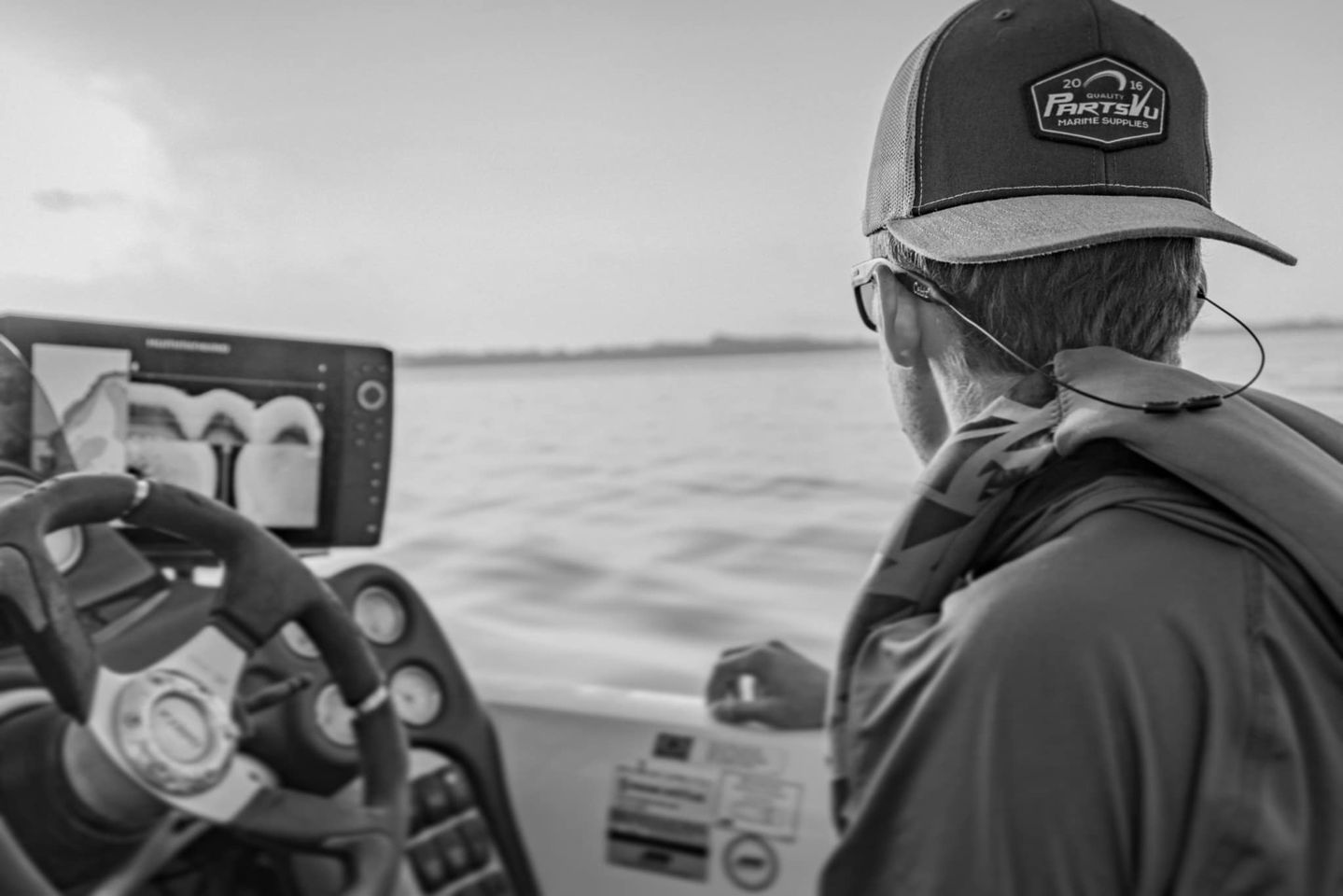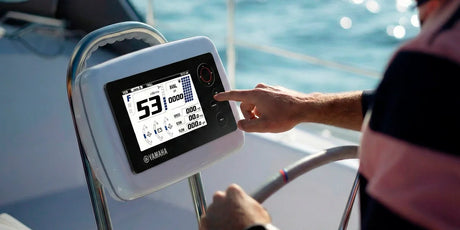PartsVu Xchange Talks Boating host Tonia Becker spoke with Drew Bradstreet, a high school senior who competes throughout the country as an angler on several bass fishing tournament circuits.
Drew is from a family with deep roots in the bass fishing scene. For many years, his grandfather was a well-known guide and tournament angler in the Central Florida area. Now, his Dad serves as a bass fishing coach and captain and is also the publisher of bassfishinginsider.com.
Drew and his brother Kamden recently earned a birth into the 2022 Abu Garcia Bassmaster National Championship held on Lake Hartwell in South Carolina. In this episode, we talk with Drew about their success at the event, including key takeaways. We also dig into Drew’s passion for bass fishing and future plans.
Want to listen to the podcast? You can find PartsVu Xchange Talks Boating on Apple Podcasts, Spotify, Amazon Music, iHeart Radio, and Stitcher.

What was the genesis of your interest in bass fishing?
Drew: My interest in bass fishing is linked to my heritage. My grandfather was an established angler in the Central Florida area. He was an active tournament fisherman and guided on some of the biggest fisheries in the area. He passed his love of fishing to my Dad, who, in turn, passed it to my siblings and me.
We also live on a small chain of lakes where we have had plenty of opportunities to get on the water. So, instead of spending time playing video games or other things, we fish.
When I discovered the tournament scene, I realized there was a great way to combine competition with fishing. At that point, I started to devote time and energy to learning more about what I love to do.
What do you think is sparking the interest in fishing, especially among younger anglers like you?
Drew: I think the competitive element of bass fishing is a catalyst for much of the growth. Fishing in bass tournaments is unique because you have the chance to fish with friends or relatives and build camaraderie. For example, I fish with my brother, and my Dad usually serves as our captain and coach, so we’re able to bond together all while competing in pretty high-stakes tournaments.
What are you competing for at these events?
Drew: We compete for scholarship money. Colleges also actively recruit top-level anglers.
Do you and your fellow competitors view yourselves as athletes in the typical sense?
Drew: I approach our tournament much like I would approach other sporting events. We usually spend two to three days practicing, followed by at least two days of competition.
We’re on our feet at least eight hours a day, all while casting, managing the boat, and working to maintain mental focus. Many times, we’re fishing in harsh weather too. So I feel like you need to condition yourself to get used to being out there for that long regularly so you can stay mentally sharp.
How do you try to stay in shape for the rigors of competition?
Drew: I don’t have a specific regimen, but I try to stay in shape, whether that means heading to the gym to work out or getting in a few games of pick-up basketball or soccer. Most importantly, I try to stay active when possible.
The key is to maintain mental focus. Mental fitness starts with physical fitness.

How are high school clubs organized?
Drew: It’s a pretty simple structure. Most clubs are open to anyone interested in joining, and there are usually no tryouts or anything of that sort.
To join, you need to contact the club director or president, who would pair you with a partner and boat captain if needed. After that, the club leader sets the course for tournament participation, practice, and fundraising duties.
Are clubs usually affiliated with particular schools?
Drew: Yes and no. Some clubs are linked directly to particular schools. However, there are also stand-alone clubs that operate independently of schools.
What happens if a kid wants to participate in a club but they don’t have a boat?
Drew: Club coordinators are great at matching kids up with a partner. In other words, if you enter a club but don’t have a boat, you’ll be paired with a teammate with a boat. Club leaders are great at piecing together things to allow all anglers to fish.
Have you witnessed a growth in the number of tournaments out there for youth anglers?
Drew: Yes, absolutely. The industry has seen an incredible surge in the number of tournaments available and the number of kids participating in these events. The junior high, high school, and college fishing tournament scene is growing exponentially.
How do you think the industry is poised to replenish the talent pool of anglers?
Drew: The system is set up to have a trickle-up effect. In other words, high school anglers participate and earn opportunities to continue in college to compete at the next level. Now, we’ve witnessed people we know who have succeeded at the collegiate level and have moved on to the highest levels of professional fishing to compete on the big stage.
What is your approach to getting better as an angler? How do you grow, develop, and learn new skills?
Drew: I value time on the water as the most important factor in understanding fish behavior. You’ve got to immerse yourself in their world to see what they do daily. I am constantly trying to learn more about feeding tendencies, weather reactions, and seasonal patterns.
If I can’t get out on the water, I consume a ton of fishing coverage. Highlight reels on YouTube tips are valuable resources. I also spend a lot of my time studying hours of footage to observe pros in real-time, real-life situations on the water. I want to understand their thought processes and dissect what they are doing to get bites.
Do you maintain a tracking log?
Drew: I do keep a log in the cloud. I try to track relevant factors like wind direction, air pressure, cloud cover, and other things so I can use that information in the future to make the best decisions on how to fish.

What role do you think electronics play in the sport today?
Drew: I think it depends on the angler. I do enjoy using electronics and feel like I can use them to possibly find fish that others might not find. I try to stay sharp on my shallow water game but try to utilize my electronics when I can because I feel like I’m targeting fish that are less pressured.
Do you think growing up in a digital age gives you an advantage over anglers who have a few years on you but grew up before the digital revolution?
Drew: Possibly. Our generation grew up in a world where electronics have always been a part of our lives, so you could argue that younger anglers have an easier time picking up on the intricacies of using digital tools.
However, when I first started fishing, I hit our small chain in a Jon boat and a trolling motor with no electronics. When I started fishing tournaments, I quickly realized that I needed to learn more about using graphs, and I had to learn from ground zero. So, I think that anyone, regardless of age, can choose to learn how to use electronics at any time.
Previous generations may take a little more determination to overcome learning curves or expand thought processes from more traditional fishing styles. Nevertheless, I think the game is changing, so it would be beneficial to spend time understanding how to put electronics into a game plan.
Can you talk about your success at the Bassmaster High School National Championship and tell us about the experience?
Drew: For this tournament, you can fish the lake until a cut-off date thirty days before the tournament. We spent some time practicing before that cut-off date and enjoyed a good amount of success during that practice time, averaging daily limits that would have won the event.
However, the lake changed over the course of the month, so when we returned for the official tournament practice period, two and a half days before the tournament, the lake was completely different.
We had to adjust our strategy to fit the conditions. Luckily, we made the right decisions and did pretty well with a little hiccup.
For the first two days of competition, all 314 teams compete simultaneously on the water. After two full days of competition, the field is narrowed down to 12 teams that move on to championship Saturday.
After day one, we were sitting in 10th place. At the end of day two, there was a little buzz around the tournament because everyone realized there was a tie for 12th place. Unfortunately, we were one of the two teams tied for that spot. A tiebreaker rule went into effect, which knocked us out of contention, so it was a heartbreaker because we didn’t have the chance to move on to the final day, Championship Saturday.
However, we had a fantastic time and are very thankful for the opportunity. We learned a ton about how to fish in changing conditions and adapt. I have zero complaints about how things went down because these things happen, and rules like this are in place for a reason. It was an incredible experience, and we hope to get back to the national championship next year if we qualify.
What do you have to do to qualify for the national championship?
Drew: It’s a pretty complicated and lengthy process. In Florida, we have eight tournaments that are qualifying events to earn your way into a state championship. Only a certain number of teams qualify for the state championship, and we did well enough to earn a spot at that event.
To earn a national championship birth by way of the state championship, teams had to finish in the top eighteen, I believe, to make the cut. So, we finished strong at our state championship to qualify for the national championship on Hartwell. You can also qualify for the national championship by fishing in national open-level events and doing well in those competitions.

What’s next for your fishing after you graduate from high school?
Drew: I’m still thinking things over. The only certainty is that I will continue to fish tournaments and do what I love.
Do you have colleges reaching out to you?
Drew: I do, and that’s something I’m considering. I’ve also thought about jumping straight into some of the semi-pro events within my region. I’m in high school but dual-enrolled in college now, so I’ll be able to transfer those credits to a college if I decide to go that route. But I’m still weighing my options.
What advice do you have for kids looking to get started in competitive fishing?
Drew: I would recommend starting at your school to determine if they already have a team. I would also recommend reaching out to one of the national trails. For example, at Bassmaster, Glenn Cale is the national tournament manager for all youth and college-related events. He is a great resource and very willing to help anyone get involved.
Also, I would be more than happy to help anyone get started. If anyone would like to contact me, they can do that through social media, and I’m usually pretty quick to respond.
For more information on the high school bass fishing scene and to follow Drew’s journey, be sure to follow him on social media. You can follow him on:
Youtube: Drew Bradstreet Fishing
Facebook: Drew Bradstreet Fishing
Instagram: Drew Bradstreet Fishing












